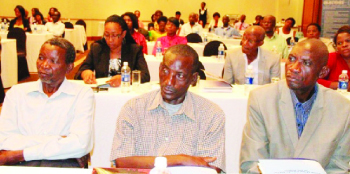By HELEN ZULU –

• SOME participants follow proceedings during the COMESA business council local sourcing partnership training programme at Pamodzi Hotel in Lusaka on Monday. Picture courtesy of COMESA secretariat.
THERE is need to put in place business models aimed at increasing sustainable partnerships with companies that can contribute in supply chains of larger enterprises in the region.
Common Market for Eastern and Southern Africa (COMESA) Business Council (CBC) chief executive officer Sandra Uwera said it was imperative to put in place business models that looked at increasing sustainable partnerships with companies that could make an input in supply chains of larger enterprises.
Ms Uwera said that a significant proportion of food and inputs in the hospitality and supermarket chains, as well as other complimentary industries continued to be imported from outside domestic territories due to substandard products by local farmers.
She said this during the official opening of the first CBC Local Sourcing for Partnerships (LSPs) Training workshop for 80 food suppliers on quality standards and food safety in Lusaka yesterday.
“As we strengthen our regional integration agenda, it is imperative to put in place business models that look at increasing sustainable partnerships with companies that can input in supply chains of larger enterprises,” she said.
Ms Uwera said there was need to maximise the potential by building on regional supply and value chains.
She said this was one of the essential ways of inclusive participation and integration of small and medium enterprises (SMEs) into trade and meaningful business development.
Ms Uwera said there were many setbacks faced by SMEs in day-to-day businesses, including poor delivery times and logistics, to substandard products and services. She said the training was a step forward in building capacity of growth enterprises while integrating them into supply chains of larger industries in the region.
“This workshop is the first phase of the one-year project to improve the quality and standards of food suppliers and other value chain actors in the hospitality, food and beverages industries, among other sectors,” she said.
As a strategic response, the LSP project aimed to increase local sourcing by large corporate companies in the COMESA region from small growth enterprises within the hospitality and agro-industry sectors, focusing mainly on food and beverages.
The project is being piloted in six COMESA states, namely, Zambia, Ethiopia, Kenya, Malawi, Rwanda and Uganda.
In Zambia, the Zambia Association of Manufacturers is the implementing partner for the project.
Commerce, Trade and Industry Minister Margaret Mwanakatwe urged SMEs to undertake partnerships with the larger corporate companies in order to improve their capacities.
The four-day training is supported by the Investment Climate Facility for Africa, United States Agency for International Development and the Private sector and is being undertaken in phases.






